"AITA For Taking Legal Action Against Friend Who Rehomed My Dog" - Redditor Asks
A distressing situation has emerged on Reddit’s AITA (Am I the A**hole) forum, where a 61-year-old woman shared her heart-wrenching story. About a year ago, she faced severe health issues that left her unable to care for her two beloved dogs.
Frequent falls and a broken foot resulted in a month-long hospital and rehabilitation stay. During this challenging time, a friend volunteered to look after her dogs.
One of the dogs was particularly challenging, and the friend, overwhelmed by the responsibility, gave the dog away to another person without informing the woman. Upon her recovery, ready to take care of her pets again, she discovered her dog had been given away and her friend, now uncontactable, had blocked her.
This betrayal led her to file a police report and a $10,000 lawsuit, seeking either the return of her dog or financial compensation. The incident has divided her friend group, with some believing she should not get her dog back.
Her story has sparked heated discussions online, highlighting the complexities of trust, responsibility, and the lengths one will go to for their loved ones. As she navigates this painful situation, she seeks both justice for her lost pet and clarity on her position in this moral quandary.
I was falling a lot and unable to get around well.

I kept down puppy pads,

The Psychological Impact of Pet Loss
Pet loss can evoke intense feelings of grief and betrayal, particularly when the circumstances surrounding it involve a friend. According to Dr. Esther Perel, a renowned couples therapist, "The loss of a pet can be as profound as the loss of a loved one, triggering a complex emotional response that includes anger, sadness, and confusion." For many, pets are considered family, and the grief associated with their loss can lead to a range of emotional responses similar to losing a family member.
I was in the hospital and the rehab hospital for about a month.

I adopted him from the humane society.

When a friend rehomes a pet, it can feel like a betrayal of trust, amplifying the emotional pain. Studies show that betrayal can activate feelings of abandonment and rejection, which are particularly sensitive areas for individuals with a history of attachment issues.
Such emotional responses are not uncommon, and they highlight the importance of understanding the psychological landscape that accompanies pet ownership.
I did not know this friend.

Didn't want to give my dog back,

The story begins with a 61-year-old woman who faced severe health issues that left her unable to care for her two dogs. During her illness, a friend offered to watch the dogs but soon found the responsibility overwhelming.
Without informing the owner, the friend gave one of the dogs to an unknown person. When the woman recovered and was ready to take care of her pets again, she discovered her dog was gone and the friend who gave it away had blocked her.
This led to her filing a police report and a $10,000 lawsuit against the friend, seeking either the return of her dog or financial compensation.
As the story unfolds, comments from Reddit users provide various perspectives on the moral and legal implications of the situation.
I shouldn't have my dog back,

It's rare enough,

Navigating Relationships with Friends
Friendship dynamics can be complicated, especially when personal boundaries are crossed. Research shows that healthy friendships are built on mutual respect and understanding, and when boundaries are violated, it can lead to conflict and emotional distress.
Open communication about expectations and feelings is vital in maintaining healthy relationships, especially when trust is broken.
If that's something OP could do, why did they stop walking the dogs and had them shitting in the apartment instead?
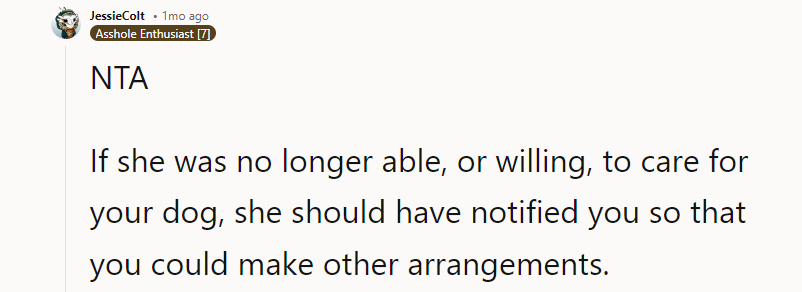
Who is buying a random shelter dog from someone? Humane societies can barely give dogs away; there are so many.

When navigating such conflicts, it is essential to express feelings honestly while being open to understanding the other person's perspective. A study published in the Journal of Social and Personal Relationships found that conflict resolution strategies that include empathy can lead to more satisfying outcomes for both parties.
By fostering a culture of understanding, friends can rebuild trust and repair their relationship.
Which is exactly why everyone is assuming the 'friend' is lying. Either the dog ran off and got lost, or she sold it, etc.
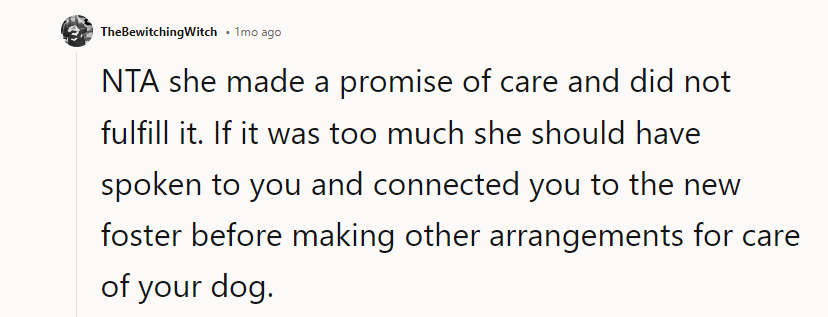
Have you thought about reporting?
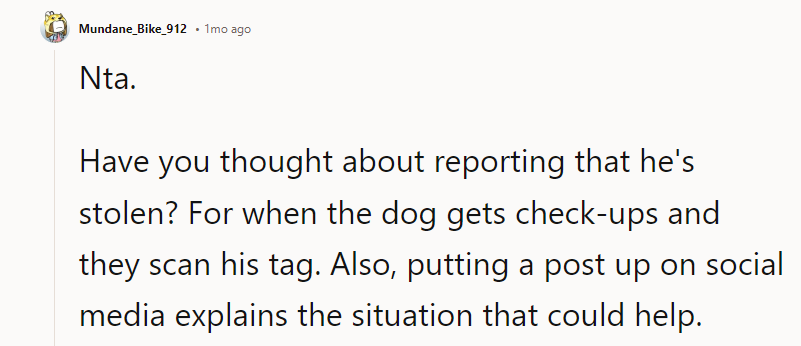
The Role of Forgiveness
Forgiveness can be a powerful tool in healing relationships, especially after feelings of betrayal. Psychological research indicates that forgiveness is not about condoning the behavior but about releasing oneself from the burden of negative emotions.
Practicing forgiveness can lead to emotional relief and is linked to improved mental health outcomes, as shown in studies published in the Journal of Health Psychology.
NTA,

These aren't your pets; they're your abuse victims. Leave them alone to recover.
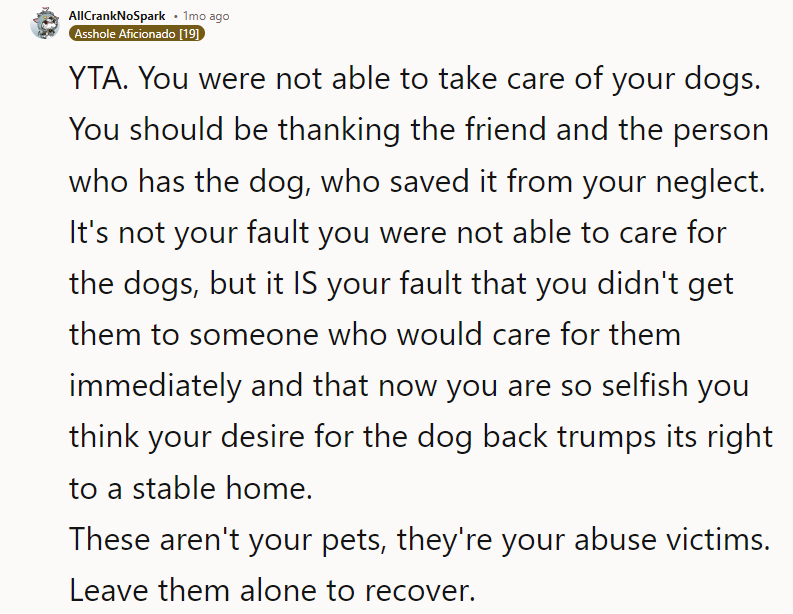
What do you think about this story?
Do you believe the woman is justified in suing her friend for giving away her dog, or is her reaction too extreme?
Share your thoughts and let us know what actions you would take if you were in her shoes. Would you resort to legal measures to get your pet back or find another way to resolve the issue?
YTA you're considering suing over something this petty?
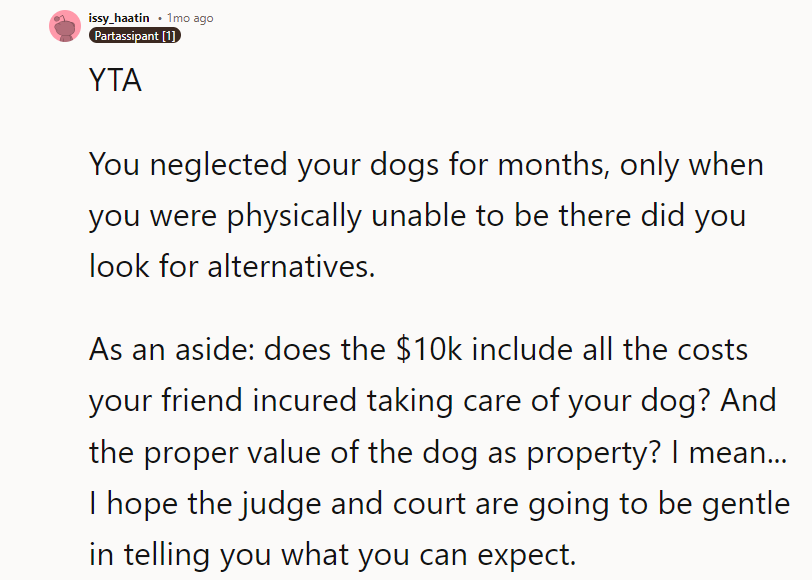
Psychological Analysis
The emotional impact of losing a pet, especially through a friend's actions, can lead to significant feelings of betrayal and grief. It's important for individuals in this situation to understand their emotions and seek support through communication or therapy to process these complex feelings effectively.
Analysis generated by AI
Analysis & Alternative Approaches
In summary, the emotional turmoil resulting from a friend's betrayal in rehoming a pet can be profound. Understanding the psychological implications of pet loss and betrayal can provide a framework for healing and rebuilding trust.
Forgiveness and self-care practices are essential components in navigating these complex emotions and fostering emotional resilience.
Engaging in self-care practices during times of grief and betrayal is critical for emotional healing. Activities such as journaling, talking to a therapist, or engaging in creative outlets can help individuals process their emotions and find closure.
Research suggests that actively engaging in self-care can enhance emotional resilience and help individuals navigate challenging situations more effectively.




